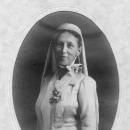Main menu
- ‘Abdu’l-Bahá’s Journey
- World Peace
- Stopping Racism in America
- Empowerment of Women
- More Principles...
- Prayer for America
Sarah Jane Farmer (1844-1916) Founder of Green Acre Bahá’í School
FIVE TALKS were delivered by ‘Abdu’l-Bahá at Green Acre between 16 and 17 August 1912. (See “Promulgation of Universal Peace” for a transcription of those talks.)
“Sarah Jane Farmer (1844 - 1916) was the founder of Green Acre Bahá’í School and was named by Shoghi Effendi as one of the nineteen Disciples of ‘Abdu’l-Bahá.
Sarah Farmer was the daughter of Eliot native Hannah Tobey Shapleigh and Moses Gerrish Farmer of Boscawen, NH, a pioneer electrical inventor. He had more than 100 patents, including the fire alarm pull box that is still in use today. Hannah’s many interests and accomplishments included raising funds to help save the old North Church in Boston from demolition; sending supplies to Southern hospitals during the Civil War, and establishing Rosemary Cottage in Eliot, ME, as a summer retreat for children and mothers from the inner city.
The Farmers were Transcendentalists who were associated with the Abolitionists and other progressive movements. Their home was a way station on the Underground Railroad. Sarah Farmer grew up knowing influential writers, inventors and thinkers of her day, including John Greenleaf Whittier; Harriet Beecher Stowe; Sojourner Truth; Dr. W.F. Channing; Frank J. Sprague, a former student of her father; Lord Kelvin, the famous English scientist; Charles Proteus Steinmetz; Professor William B. Rogers; and her father’s brother-in-law, writer Charles Carleton Coffin. These associations contributed to Sarah Farmer’s understanding of social problems and the importance of peace, freedom and equality.
In 1890, Sarah Farmer joined four businessmen to open a hotel in Eliot. The poet John Greenleaf Whittier came that first summer and gave Green Acre its name. In 1892, Sarah Farmer had a vision that Green Acre should offer conferences on progressive subjects the sciences, arts and religion universal in scope and open to all races and creeds. Over time, these conferences brought together leading writers, educators, philosophers, artists and activists.
In 1894, under a tent banked by fragrant pines, Sarah Farmer dedicated Green Acre to the ideals of peace and religious unity and founded the “Green Acre Conferences.” She raised the world’s first known peace flag, explaining: “In looking for an emblem, we wanted something that would be a call to everybody and fit everybody-and we felt that the Message that had been brought to the world by prophet after prophet was the message of ‘Peace.’ So we have put on a large banner over our heads: PEACE.”
The flag was 36 feet long with green letters on a white background. It hung on an 85-foot flagpole that was once a ship’s mast. Each year, the flag raising was followed by a series of lectures that continued throughout the summer. The Green Acre Conferences brought together leaders of thought from around the world to speak on such subjects as international peace, religious tradition and practice, the arts, sciences, education and philosophy. By 1897, the Green Acre Conferences were known around the world. The annual raising of the Peace Flag is a tradition that continues today.
In 1900, during a time of great personal anguish for Sarah Farmer, she traveled to Palestine and met ‘Abdu’l-Bahá, the son of the Founder of the Bahá’íFaith and head of the Bahá’ícommunity at that time. It was there that she became devoted to the Bahá’íFaith and its teachings on the oneness of humanity, the necessity and inevitability of world peace, and the oneness and progressive unfoldment of religion.
Sarah Farmer brought her discovery of this new religion back to Green Acre and supplemented the materials and lectures offered there with the teachings and principles of the Bahá’íFaith. Today, Green Acre, an historic Bahá’ícenter of learning, continues to foster such Bahá’íideals as the oneness of humankind, world peace, race unity, and the equality of women and men.”
http://bahaikipedia.org/Sarah_Farmer









